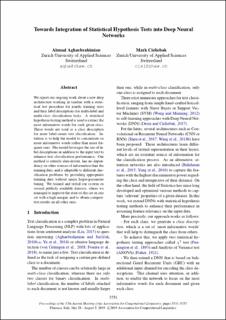Please use this identifier to cite or link to this item:
https://doi.org/10.21256/zhaw-19010| Publication type: | Conference paper |
| Type of review: | Peer review (publication) |
| Title: | Towards integration of statistical hypothesis tests into deep neural networks |
| Authors: | Aghaebrahimian, Ahmad Cieliebak, Mark |
| et. al: | No |
| DOI: | 10.18653/v1/P19-1557 10.21256/zhaw-19010 |
| Proceedings: | Proceedings of the 57th Annual Meeting of the Association for Computational Linguistics |
| Page(s): | 5551 |
| Pages to: | 5557 |
| Conference details: | 57th Annual Meeting of the Association for Computational Linguistics, Florence, Italy, 28 July - 2 August 2019 |
| Issue Date: | 2019 |
| Publisher / Ed. Institution: | Association for Computational Linguistics |
| ISBN: | 978-1-950737-48-2 |
| Language: | English |
| Subject (DDC): | 410.285: Computational linguistics |
| Abstract: | We report our ongoing work about a new deep architecture working in tandem with a statistical test procedure for jointly training texts and their label descriptions for multi-label and multi-class classification tasks. A statistical hypothesis testing method is used to extract the most informative words for each given class. These words are used as a class description for more label-aware text classification. Intuition is to help the model to concentrate on more informative words rather than more frequent ones. The model leverages the use of label descriptions in addition to the input text to enhance text classification performance. Our method is entirely data-driven, has no dependency on other sources of information than the training data, and is adaptable to different classification problems by providing appropriate training data without major hyper-parameter tuning. We trained and tested our system on several publicly available datasets, where we managed to improve the state-of-the-art on one set with a high margin and to obtain competitive results on all other ones. |
| URI: | https://digitalcollection.zhaw.ch/handle/11475/19010 |
| Fulltext version: | Published version |
| License (according to publishing contract): | CC BY 4.0: Attribution 4.0 International |
| Departement: | School of Engineering |
| Organisational Unit: | Institute of Computer Science (InIT) |
| Appears in collections: | Publikationen School of Engineering |
Files in This Item:
| File | Description | Size | Format | |
|---|---|---|---|---|
| P19-1557.pdf | 276.2 kB | Adobe PDF |  View/Open |
Show full item record
Aghaebrahimian, A., & Cieliebak, M. (2019). Towards integration of statistical hypothesis tests into deep neural networks [Conference paper]. Proceedings of the 57th Annual Meeting of the Association for Computational Linguistics, 5551–5557. https://doi.org/10.18653/v1/P19-1557
Aghaebrahimian, A. and Cieliebak, M. (2019) ‘Towards integration of statistical hypothesis tests into deep neural networks’, in Proceedings of the 57th Annual Meeting of the Association for Computational Linguistics. Association for Computational Linguistics, pp. 5551–5557. Available at: https://doi.org/10.18653/v1/P19-1557.
A. Aghaebrahimian and M. Cieliebak, “Towards integration of statistical hypothesis tests into deep neural networks,” in Proceedings of the 57th Annual Meeting of the Association for Computational Linguistics, 2019, pp. 5551–5557. doi: 10.18653/v1/P19-1557.
AGHAEBRAHIMIAN, Ahmad und Mark CIELIEBAK, 2019. Towards integration of statistical hypothesis tests into deep neural networks. In: Proceedings of the 57th Annual Meeting of the Association for Computational Linguistics. Conference paper. Association for Computational Linguistics. 2019. S. 5551–5557. ISBN 978-1-950737-48-2
Aghaebrahimian, Ahmad, and Mark Cieliebak. 2019. “Towards Integration of Statistical Hypothesis Tests into Deep Neural Networks.” Conference paper. In Proceedings of the 57th Annual Meeting of the Association for Computational Linguistics, 5551–57. Association for Computational Linguistics. https://doi.org/10.18653/v1/P19-1557.
Aghaebrahimian, Ahmad, and Mark Cieliebak. “Towards Integration of Statistical Hypothesis Tests into Deep Neural Networks.” Proceedings of the 57th Annual Meeting of the Association for Computational Linguistics, Association for Computational Linguistics, 2019, pp. 5551–57, https://doi.org/10.18653/v1/P19-1557.
Items in DSpace are protected by copyright, with all rights reserved, unless otherwise indicated.